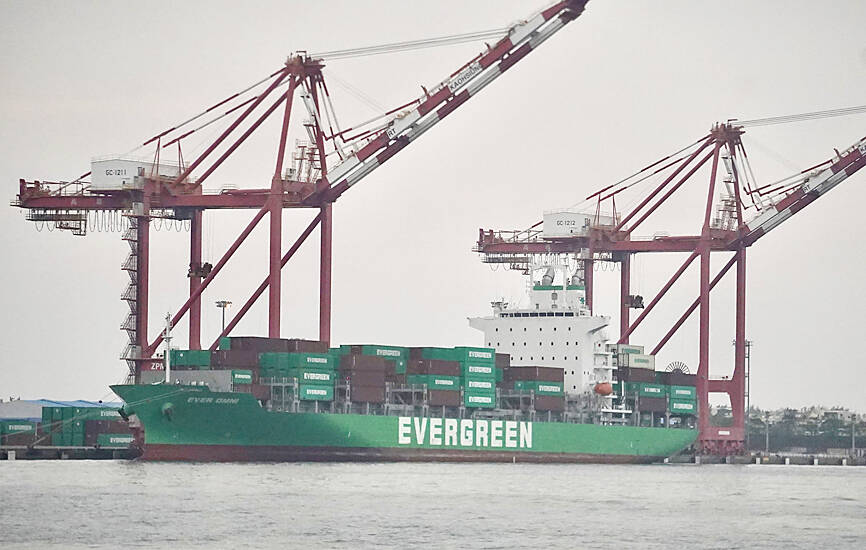Exports last month fell 4.5 percent to US$38.11 billion, snapping a rebound in September, as the global economic slowdown curtailed demand for tech as well as non-tech products, offsetting strong demand for devices used in artificial intelligence, the Ministry of Finance said yesterday.
The economic gauge could resume a modest uptick of 3 to 6 percent this month, as shipments of electronics could emerge from inventory adjustments and move toward a recovery, Department of Statistics Director-General Beatrice Tsai (蔡美娜) said.
“That may happen this month or in January of next year at the latest,” Tsai said, adding that recent guidance by Taiwan Semiconductor Manufacturing Co (TSMC, 台積電), the world’s largest contract chipmaker, lent support to the observation.

Photo: CNA
TSMC said last month it has spotted early signs of stabilization in demand for personal computers and smartphones following several quarters of inventory adjustments, which suggest healthy business for next year.
Exports of electronics, which accounted for 41 percent of all outbound shipments, decreased 7.4 percent year-on-year to US$15.64 billion, as firms remained cautious in dealing with sticky inflation, monetary tightening and intensifying geopolitical tensions, Tsai said.
Conservative sentiment hit all product categories except for information and communications technology (ICT) products, which surged 37.6 percent from a year earlier to US$9 billion, thanks to exploding artificial intelligence applications in the US, she said.
That explained why shipments bound for the US market spiked 12.1 percent to a new high of US$7.19 billion, Tsai said, adding that the picture was not bright elsewhere.
Exports tumbled 22.7 percent to Japan, softened 16.8 percent to Europe and decreased 3.6 percent to China, consistent with their lackluster economic showings, Tsai said.
Shipments to ASEAN markets squeezed out a 1.5 percent increase, also on the back of ICT products, the ministry found.
Imports retreated at a faster pace of 12.3 percent to US$32.34 billion, falling for 12 months in a row, it said. The data gave Taiwan a trade surplus of US$5.77 billion, an increase of 91.2 percent from a year earlier, Tsai said.
Taiwanese firms bought US$8.85 billion worth of electronics that would later be turned into exports, another sign that a recovery might be just around the corner, she said.
However, imports of capital equipment plunged 32 percent to US$4.9 billion, with imports of semiconductor equipment diving 54.6 percent to US$1.69 billion, the ministry said.
Vanguard International Semiconductor Corp (世界先進) yesterday trimmed its capital spending for the third time to NT$9 billion (US$279.5 million) this year, citing poor sales and order visibility.
In the first 10 months, exports fell 12.9 percent to US$355.09 billion, while imports decreased 19 percent to US$295.44 billion, the ministry said.
Tsai said exports for the whole of this year are bound to weaken 10 percent from last year.

Semiconductor business between Taiwan and the US is a “win-win” model for both sides given the high level of complementarity, the government said yesterday responding to tariff threats from US President Donald Trump. Home to the world’s largest contract chipmaker, Taiwan Semiconductor Manufacturing Co (TSMC, 台積電), Taiwan is a key link in the global technology supply chain for companies such as Apple Inc and Nvidia Corp. Trump said on Monday he plans to impose tariffs on imported chips, pharmaceuticals and steel in an effort to get the producers to make them in the US. “Taiwan and the US semiconductor and other technology industries

SMALL AND EFFICIENT: The Chinese AI app’s initial success has spurred worries in the US that its tech giants’ massive AI spending needs re-evaluation, a market strategist said Chinese artificial intelligence (AI) start-up DeepSeek’s (深度求索) eponymous AI assistant rocketed to the top of Apple Inc’s iPhone download charts, stirring doubts in Silicon Valley about the strength of the US’ technological dominance. The app’s underlying AI model is widely seen as competitive with OpenAI and Meta Platforms Inc’s latest. Its claim that it cost much less to train and develop triggered share moves across Asia’s supply chain. Chinese tech firms linked to DeepSeek, such as Iflytek Co (科大訊飛), surged yesterday, while chipmaking tool makers like Advantest Corp slumped on the potential threat to demand for Nvidia Corp’s AI accelerators. US stock

The US Federal Reserve is expected to announce a pause in rate cuts on Wednesday, as policymakers look to continue tackling inflation under close and vocal scrutiny from US President Donald Trump. The Fed cut its key lending rate by a full percentage point in the final four months of last year and indicated it would move more cautiously going forward amid an uptick in inflation away from its long-term target of 2 percent. “I think they will do nothing, and I think they should do nothing,” Federal Reserve Bank of St Louis former president Jim Bullard said. “I think the

SUBSIDIES: The nominee for commerce secretary indicated the Trump administration wants to put its stamp on the plan, but not unravel it entirely US President Donald Trump’s pick to lead the agency in charge of a US$52 billion semiconductor subsidy program declined to give it unqualified support, raising questions about the disbursement of funds to companies like Intel Corp and Taiwan Semiconductor Manufacturing Co (台積電). “I can’t say that I can honor something I haven’t read,” Howard Lutnick, Trump’s nominee for commerce secretary, said of the binding CHIPS and Science Act awards in a confirmation hearing on Wednesday. “To the extent monies have been disbursed, I would commit to rigorously enforcing documents that have been signed by those companies to make sure we get